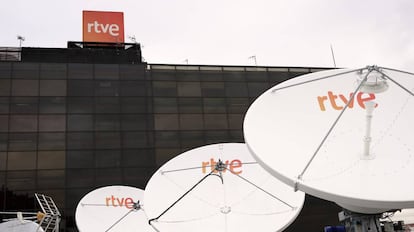Spain’s state broadcaster: out of touch, out of money and out of ideas
New report says RTVE has “failed to adapt to changing times” and continues to lose money


Spain’s state broadcaster, RTVE is obsolete: it has failed to adapt to the changing habits of viewers as well as to the demands of the digital age and is in urgent need of a “strategic plan for the future” if it is to meet the “internal and external” challenges it faces, says a new report by the SEPI, the state body run by the Economy Ministry that controls 95% of the organization.
A new report by SEPI describes 2015 as a “difficult” year, saying the absence of a government in Spain since December has meant long-standing problems have not been tackled. At the same time, it highlights competition from domestic players like Movistar, Orange and Vodaphone, which offer digital content, along with the entry of overseas competitors such as Netflix, which began operating here last year, and HBO, which intends to start serving Spain later this year.
“RTVE faces multiple challenges,” says the SEPI report, due to an environment in which viewers’ habits “are changing drastically, both in terms of taste and the way they watch content,” and concluding that the broadcaster is not competitive.
RTVE’s problems are in large part due to a massive drop in income. The first came in 2009 when the government deciided it would no longer be able to show advertisements
The state broadcaster has failed to adapt to an environment dominated by the internet, says the SEPI, noting that the websites of the two leading private media groups, Mediaset and Atresmedia, have 11 million and 9.5 million unique viewers respectively, while RTVE has just 6.9, despite possessing “the largest audiovisual archive in the Spanish-speaking world”, with more than 600,000 programs.
RTVE has also failed to hold on to its television audience. Its main La 1 channel has an audience share of just 9.8%. Mediaset, which has seven channels, has a 31% share, while Atresmedia, with six channels, has a 26.8% audience share. TVE and its five national channels, have a total of 16.7%.
The broadcaster’s financial results speak volumes: while Mediaset and Atresmedia reported profits of €166 million and €99 million last year, RTVE lost €37 million.
Sign up for our newsletter
EL PAÍS English Edition has launched a weekly newsletter. Sign up today to receive a selection of our best stories in your inbox every Saturday morning. For full details about how to subscribe, click here
Those losses would have been much higher had RTVE not been given a VAT rebate, equivalent to a cash injection of €78.7 million.
RTVE’s problems are in large part due to a massive drop in income. The first came in 2009 when the government deciided it would no longer be able to show advertisements, taking away some €450 million in one fell swoop. The idea was that the private channels would contribute to funding RTVE from the extra advertising it was assumed they would pick up. But over the last five years, their contribution has steadily fallen. The second blow came when RTVE’s state funding was cut by 30% between 2010 and 2013 as part of government austerity measures.
English version by Nick Lyne.
Tu suscripción se está usando en otro dispositivo
¿Quieres añadir otro usuario a tu suscripción?
Si continúas leyendo en este dispositivo, no se podrá leer en el otro.
FlechaTu suscripción se está usando en otro dispositivo y solo puedes acceder a EL PAÍS desde un dispositivo a la vez.
Si quieres compartir tu cuenta, cambia tu suscripción a la modalidad Premium, así podrás añadir otro usuario. Cada uno accederá con su propia cuenta de email, lo que os permitirá personalizar vuestra experiencia en EL PAÍS.
¿Tienes una suscripción de empresa? Accede aquí para contratar más cuentas.
En el caso de no saber quién está usando tu cuenta, te recomendamos cambiar tu contraseña aquí.
Si decides continuar compartiendo tu cuenta, este mensaje se mostrará en tu dispositivo y en el de la otra persona que está usando tu cuenta de forma indefinida, afectando a tu experiencia de lectura. Puedes consultar aquí los términos y condiciones de la suscripción digital.








































